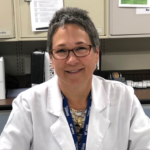Editor’s Note: This story is part of a special series examining the growing number of women in pharmacy leadership.

Kelly Epplen, Pharm.D., BCACP, FASHP
JUGGLING YOUR CAREER, KIDS, HOBBIES, AND FRIENDSHIPS can sometimes be a wobbly balancing act, but Kelly Epplen, Pharm.D., BCACP, FASHP, has integrated the elements of work and family into a cohesive and satisfying lifestyle.
“I believe having a rewarding career has made me a better mother, and being a good mom has made me a better practitioner,” said Dr. Epplen, Associate Professor of Clinical Pharmacy Practice and Administrative Sciences at the James L. Winkle College of Pharmacy at the University of Cincinnati. “Being a mother is the most rewarding, most challenging, and most important job I have, but being a pharmacist completes me as a person. And the nurturing elements of motherhood bleed into my role as a healthcare professional.”
A Balancing Act
With four teenagers, coordinating a career and a family is not easy. “I may get up at 3 a.m. to read an article, prepare for a lecture, or write a paper so that I can get my kids up at 6 a.m. and get them out the door for school,” she said. “Or I may leave work at 3 p.m. to get to a baseball game or volleyball match, and then pick work back up at 8 p.m. It is not for everyone, but it works for me!”
Dr. Epplen and her husband have a team approach to raising their children, which gives each of them the time and space to pursue their own professional goals. While this approach has been successful, it has also led to occasional work and family clashes.
For instance, Dr. Epplen was scheduled to deliver a presentation at the 2016 ASHP Summer Meetings that coincided with her daughter’s eighth-grade play. “I was so upset I had to miss her play. Ask any mom who works outside the home — the guilt can be overwhelming at times!” she said. “But I sat her down and explained the situation. It turned out that she was completely OK with it, and I quickly remembered that I am raising strong, independent kids who often are more mature than I give them credit for.”
Ambulatory Care Expertise
That strength and independence are some of the characteristics Dr. Epplen models for her children. Since becoming a board-certified ambulatory care specialist in 2011, she has largely dedicated her career in pharmacy to enhancing clinical roles for pharmacists in the ambulatory setting to improve patient care.
“I have had the opportunity to justify, develop, establish, and maintain several ambulatory care services across multiple health systems in the Greater Cincinnati area,” she noted, pointing to her work in anticoagulation, pharmacotherapy, and family medicine. “My goal right now is to establish the role of ambulatory care pharmacists within the accountable care organization [ACO] at which I practice and to demonstrate how pharmacists can significantly improve quality of care for high-risk populations while creating a positive return on investment.”
For example, she has led projects looking at medication-related performance measures in medication adherence and the management of osteoporosis in women. She found that pharmacists’ interventions helped significantly improve Star Ratings and contribute to increased incentive payments in this value-based performance environment.
A Real Person
A faculty member at the University of Cincinnati College of Pharmacy since 2009, Dr. Epplen’s primary teaching responsibilities focus on women’s health and topics in health-system pharmacy practice, professional practice development, and pharmacy management.

Dr. Epplen serves as the faculty advisor for Ana Jenjebir, a student pharmacist.
Dr. Epplen said she starts the course on health-system pharmacy practice by painting a full picture of her life, sharing what she finds exciting about pharmacy as well as other activities she participates in outside of clinical practice.
“I think it is important that students understand that I am a real person, including being a mom, a pharmacist, an ambulatory care specialist, a professional, and an advocate for the profession,” she said.
Dr. Epplen typically precepts two Advanced Pharmacy Practice Experience students per month, chairs the Honor Council for the University of Cincinnati College of Pharmacy, serves as a continuing education administrator, and sits on the college’s Reappointment, Promotion, and Tenure committee.
“Inevitably, after class I have a line of female students wanting to know how I balance everything. However, I tell them that, to me, there is no balance. Integration of work and home life is essential to my success,” she said.
ASHP Roles
Dr. Epplen has been an active ASHP member since 1997 and was introduced to service opportunities within ASHP by her own female role model and mentor, ASHP Past President Marianne Ivey, Pharm.D., M.P.H., FASHP. Dr. Epplen became active in ASHP’s Section of Ambulatory Care Practitioners (SACP) 20 years ago through her involvement in the Section Advisory Group on Reimbursement for Cognitive Services (now called the Section Advisory Group on Compensation and Practice Sustainability)
She is a Fellow of ASHP and served as the Chair of the Executive Committee of SACP from 2015 to 2016. “Being elected Chair was one of the proudest moments I have ever had professionally,” Dr. Epplen recalled. “It was a professional validation that I had been elected by my peers to represent one of the fastest-growing sections of our professional community.”
The leadership role offered Dr. Epplen an opportunity to advance ambulatory care pharmacy practice and share her experiences in ambulatory care with initiates to the field. “It was also as an opportunity to learn from advanced practitioners with established ambulatory care services,” she noted.
As gratifying as it was to be elected Chair of a prominent ASHP committee, Dr. Epplen noted that the pinnacle of her career as an ambulatory care pharmacy specialist was speaking at ASHP’s inaugural Ambulatory Care Summit in 2014.
“To be a part of such a gathering of ambulatory care specialists from across the country, as we came together to define ambulatory care pharmacy practice and our roles and responsibilities in patient care, was truly inspiring,” said Dr. Epplen, who authored a briefing paper for the summit, co-authored ASHP’s Minimum Standard for Ambulatory Care Pharmacy Practice, and co-authored a chapter in Building Ambulatory Care Services.
“Ambulatory care pharmacy practice has experienced significant growth over the last decade, and I am proud to say that I have been present for that growth!” she said.
Advice for Young Women Pharmacists

Dr. Epplen often collaborates with members of the ASHP Section of Ambulatory Care Practitioners.
Dr. Epplen has had many opportunities to work alongside strong female ambulatory care leaders. “All of these women exhibited characteristics that I have incorporated into my work life: dedication, determination, confidence, and independence,” she said.
Based on the wisdom she’s gleaned from her mentors and the experience she has gained, Dr. Epplen has some advice for women starting their careers in ambulatory care pharmacy: “Find successful female professionals to emulate, take time to meet with them often, and ask them what they love about their career path and what pitfalls to look out for,” she recommended.
Women pharmacists should also consider identifying their professional and personal goals, giving thought to how these goals complement each other, and figuring out how barriers might prevent them from achieving those goals, Dr. Epplen added.
“Learn how to integrate your personal and professional lives. Figure out how it can work for you and your family,” she suggested. “And realize that your house may not always be perfect. You may not be at every dance recital or sporting event. Your laundry may not always be done. And then realize that it is okay! Give yourself a break!”
By David Wild
# # #








 If you want to contribute tutorials, news or other stuff please contact us. We pay 150 for each approved article.
If you want to contribute tutorials, news or other stuff please contact us. We pay 150 for each approved article. Consectetur adipisicing elit. Sed do eiusmod tempor incididunt ut labore.
Consectetur adipisicing elit. Sed do eiusmod tempor incididunt ut labore. This site uses valid HTML and CSS. All content Copyright © 2010 Newscast, Inc
This site uses valid HTML and CSS. All content Copyright © 2010 Newscast, Inc If you like what we do, please don't hestitate and subscribe to our
If you like what we do, please don't hestitate and subscribe to our